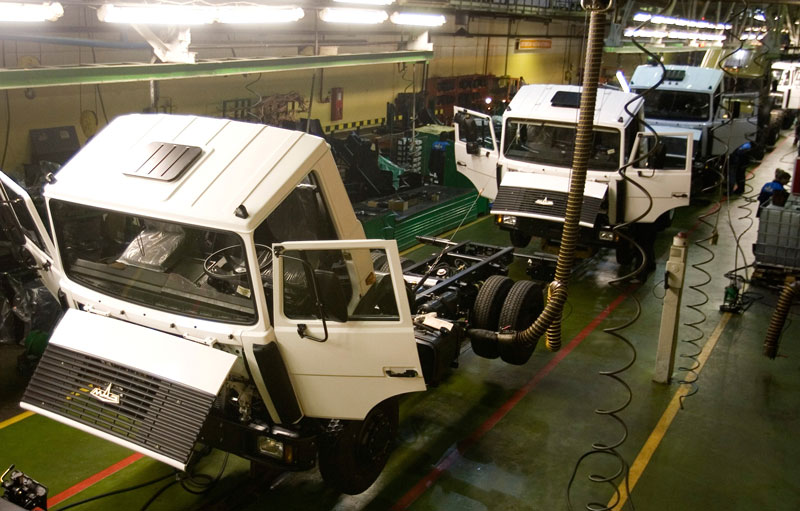
Will the West, East or the Far East Shape Belarus’s Future?
Publication: Eurasia Daily Monitor Volume: 10 Issue: 108
By:

The existential reality of Belarus, squeezed between Russia and the European Union, is its crucial dependency on external geopolitical factors. If anything, the recent slump in Belarus’s exports exacerbates this dependency. In the first quarter of 2013, exports decreased by 20.5 percent compared with the first quarter of 2012; whereas, exports to the EU decreased by a massive 42.2 percent. The EU is the destination of 34.9 percent of Belarus’s exports, so the loss of revenue is painful. According to independent experts, it is the result of Russia having closed a loophole (see EDM, September 20, 2012; January 10) that allowed Belarus to sell solvents and paint thinners to the EU while avoiding paying export duties to the Russian treasury (https://naviny.by/rubrics/economic/2013/06/02/ic_articles_113_181940/).
What is more, trade exchange between the three partners of the Custom Union—Belarus, Russia and Kazakhstan—declined by 15 percent (see EDM, June 5; https://naviny.by/rubrics/politic/2013/06/01/ic_articles_112_181932/), and the exchange between Belarus and Russia declined by 30 percent (https://ej.ru/?a=note&id=12997#). In the first quarter of 2013, Russia bought 43.6 percent less trucks, 28 percent less tractors, and 18 percent less agricultural machines than in the first quarter of 2012. This dynamic may be due to Russia’s accession to the World Trade Organization. As a result, many new competitors of Belarusian producers have entered the Russian market (https://nmnby.eu/news/analytics/5190.html). In his speech at the Business Forum of the Common Economic Space (Minsk, 31 May), Prime Minister Mikhail Myasnikovich stated that during the last five years, the overall market share of MAZ (Minsk Automobile Factory) and KAMAZ (Kama Automobile Factory in Naberezhnye Chelny, Russia) trucks in Russia, Belarus and Kazakhstan has declined from 50 to 35 percent. “That means,” Myasnikovich said, “that we have surrendered our growing markets to producers from third countries” (https://naviny.by/rubrics/economic/2013/06/04/ic_articles_113_181956/). Myasnikovich’s government demands that Belarusian producers enter new national markets: 48 target countries are mentioned in this regard in the Council of Ministers Ruling issued on May 20. In the meantime, the warehouses are full of industrial products that have not been sold (https://naviny.by/rubrics/politic/2013/05/30/ic_articles_112_181917/).
Similar impasses occurred in the past but have been overcome. Whether or not this is going to be the case again, pinning hopes on external actors becomes irresistible. For example, having returned from the meeting of the Supreme Eurasian Economic Council (held in Astana, Kazakhstan on May 23), Alyaksandr Lukashenka announced that Russia promised by January 1, 2015, to stop charging Belarus for its export of petroleum products extracted from Russian oil (https://naviny.by/rubrics/politic/2013/06/01/ic_articles_112_181932/).
Compared with the potential implications of waiving oil export duties by Russia, the recent concessions of the West seem to be minuscule. The United States’ Department of State lifted sanctions from one more Belarusian enterprise, a producer of optical equipment, BelOMO (https://belnovosti.by/politics/8942-amerika-snjala-sankcii-eshhe-s-odnogo-belorusskogo-predprijatija.html). The EU lifted sanctions from the hard liquor producer Akvadiv and from the developer and operator of electronic games Sport-Pari. The former deputy editor of Belarus Segodnya, Anna Shadrina, was removed from the visa ban list (www.gazetaby.com/cont/art.php?sn_nid=57308?), and the Italian ambassador to Minsk reminded yet again that the release of political prisoners would unfreeze Belarus’s relationship with the EU right away (https://www.iarex.ru/fd-non/37390.html).
It seems, however, that the position of the promoters of sanctions is not as unassailable as before, irrespective of political prisoners. For example, the speech of the most ardent supporter of sanctions, David Kramer of the Washington-based human rights watchdog Freedom House, at the conference in Tallinn, “The Eurasian challenge to the European prospect for Belarus” (see EDM, 31 May), elicited many objections from among the participants. Thus, Alexander Klaskovsky claims that “even if sanctions succeed in driving Belarus into chaos, this should not necessarily lead to a triumph of democracy. And is it not risky to set up a survival experiment on the entire people and the fate of a country?” In his turn, Yury Zisser, the founder and owner of Tut.by, Belarus’s most popular independent news portal, said that the West focuses only on “those 200 people who go to embassy receptions,” but forgets about the other 9.5 million Belarusians. According to Zisser, “sanctions can only drive a situation to a stalemate” (https://naviny.by/rubrics/politic/2013/05/29/ic_articles_112_181908/). Finally, “under the pressure of experts (who among other things asked the question why [Azerbaijani President] Ilham Aliyev is welcomed in the EU and Lukashenka is not, even though there is no shortage of political prisoners in Azerbaijan), Kramer had to acknowledge that the West practices double standards and that change in Belarus ought to come from within” (https://naviny.by/rubrics/politic/2013/05/29/ic_articles_112_181908/).
Given the bittersweet developments on Belarus’s eastern flank and a lack of significant progress in its relationship with the West, only Chinese investors appear to induce optimism. According to Bloomberg, “China is building an entire city in the forests near the Belarusian capital Minsk to create a manufacturing springboard between the EU and Russia… The hub will put Chinese exporters within 170 miles of EU members Poland and Lithuania and give them tax-free entry into Russia and Kazakhstan, which share a customs union. It will also let them draw from a workforce that’s 99.6-percent literate and makes $560 a month on average, half the Polish wage” (https://www.bloomberg.com/news/2013-05-26/china-builds-eu-beachhead-with-5-billion-city-in-belarus.html). “This is a unique project,” Gong Jianwei, China’s ambassador to Belarus, said on state television on May 17. “Nobody will be able to build anything like this industrial park anywhere else in Europe anymore. The infrastructure is so powerful.” The first stage of the Chinese industrial park is scheduled to be completed by 2020, with the second stage taking another ten years. China agreed to finance the venture with low-interest loans as long as half the money is spent on Chinese materials, technology or labor, according to Kirill Koroteev, deputy head of Industrial Park Development Co., which is 60-percent owned by a unit of China National Machinery Industry Corp. and 40-percent owned by Belarus’s government.
In the end, neither the East nor the West will likely determine Belarus’s future. Apparently the government in Minsk is not waiting for leniency from Belarus’s immediate neighbors but is vigorously negotiating favorable deals for Belarus and is seeking markets and investors all over the world.




